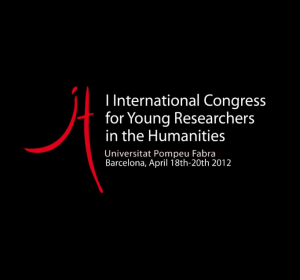 La revue Forma, l’Institut Universitari de Cultura et le Département de sciences humaines de l’Universitat Pompeu Fabra sont heureux d’acueillir le premier congrès international de chercheurs en scienes humaines, qui aura lieu du 18 à 20 d’avril 2012 sur le Campus de la Ciutadella de la UPF (Barcelone). Cet évènement a comme objectif de proposer un espace où les étudiants, qui commencent des investigations dans le domaine des sciences humaines, peuvent confronter leurs propres conclusions, sujets et méthodologies.
La revue Forma, l’Institut Universitari de Cultura et le Département de sciences humaines de l’Universitat Pompeu Fabra sont heureux d’acueillir le premier congrès international de chercheurs en scienes humaines, qui aura lieu du 18 à 20 d’avril 2012 sur le Campus de la Ciutadella de la UPF (Barcelone). Cet évènement a comme objectif de proposer un espace où les étudiants, qui commencent des investigations dans le domaine des sciences humaines, peuvent confronter leurs propres conclusions, sujets et méthodologies.
It has been a long time since the studies on Humanities within the Academy have been holding intensive debates on the legitimacy of its interdisciplinary studies and the risks of a methodology, which is increasingly “open” for all sorts of influences. However, being aware of this double-edged sword”, we encourage all to present their researches on this matter. To which point have these methods led us? How have they contributed to the comparative studies on art, literature, music, cinema, history, politics, philosophy, etc.?
The Scientific Board invites everyone who shares these academic interests to send their proposal in 250 words, and a CV of ca. 100 words, written in English or any Romanic language. Submissions will be received by December 30th 2011 and sent to the following mailbox: congreshumanitats.forma@upf.edu
Confirmed conferences and round tables:
Inaugural conference by Toni Negri.
Round tables:
- Art History? The Interdisciplinary and its Enemies held by Isabel Valverde (Universitat Pompeu Fabra. Invited professors: Isabel Cervera (Universidad Autónoma de Madrid) and Joan Sureda (Universitat de Barcelona).
- Literary Historiography in the 21st. Century held by Domingo Ródenas de Moya. Invited professors: Jordi García (Universitat de Barcelona) and Fernando R. de la Flor (Universidad de Salamanca).
Research lines
Through this initiative we hope to set a proper space for young researchers (PhD candidates or PhDs who have presented their dissertations after April 2008) to show their new approaches, techniques and methodologies, currently applied in any discipline of the humanities.
In a world of constant change, the interdisciplinary studies have been able to provide innovative and suitable results in different fields of research, which seemed to be completely saturated. We hence hope to establish a dialogue between these new lines of research in history, philosophy, art, literature, music, etc. addressing our call to all sorts of humanistic and comparative disciplines. Following subjects of general interests are here suggested:
- Visual Culture: we call to debate on the complexity of the image and its different media nowadays, emphasizing on the digital world and the new technologies. We stress the importance of the interactive universes of the visual world, as well as its correspondence with different spheres of the humanities, such as literature, music, etc., and its pedagogical and epistemological function.
- World History: this branch of history allows researchers to free themselves from problematic historical approaches, such as the so-called “national” studies, the lack of geographic concretion, or the need to specialize in other different branches.
- Philosophy and cultural theory: the philosophical discourse and its cultural usage provides a debate between all different branches of thought -ethic, aesthetic, political, metaphysical, etc.-, and the postmodern society in its different manifestations and representations.
- Comparative studies: the combination of different disciplines, historical periods, and methodologies, have provided the emergence of new contributions on discourses that seemed saturated. We open the debate on the advantages of this tool, as well as on the conflicts it has lead us to, like the historical hermeneutics and diachronic comparisons of cultural manifestations.
- Humanities and the digital age: the digital age as an impending reality raises different questions: What role does it have in the present research? How is it being implemented? We call for communications that focus on the digital world as an object of study as well as a tool for research.
Registration
Communications:
Duration: 20 minutes
Language: English, French, Italian, Spanish, Catalan
Publication at FORMA
Admission:
Deadline for submission of abstracts: December 31th 2011
Length: 250 words
CV: 100 words
Languages: English, French, Italian, Spanish, Catalan
Registrations cost for speakers (Spain and foreign countries): 35 euros
Date and place
From April 18th to 20th 2012
Universitat Pompeu Fabra Campus Ciutadella.
C/ Ramon Trias Farga, 25.27
08025 Barcelona
Spain
Contact
congreshumanitats.forma@upf.edu
revista.forma@upf.edu
Organizers
Scientific Committee
- Agata Bieik-Robson, Polish Academy of Science and University of Nottingham
- Rodrigo Francisco Browne Sartori, Universidad Autónoma de Chile
- Marcel Cano Soler, Universitat de Barcelona
- Antoni Luna, Universitat Pompeu Fabra
- Marlene Montes de Sommer, Universität Kassel
- Francesca Noto, Università degli Studi di Palermo
- Estela Ocampo, Universitat Pompeu Fabra
- Begonya Saez Tajafuerce, Universitat Autònoma de Barcelona
- Victor Manuel Silva Echeto, Universidad de Valencia
- María D. Martos, Universidad Castilla-La Mancha
- Eugenio Trías, Universitat Pompeu Fabra
- Valerie Wilhite, Miami University
Organizing Committee
Members of the Editorial Board from FORMA Journal
Alessandra Caputo Jaffé
Maximino Gandul Galiano
Antonio Gómez Villar
Fernando Janeiro Torres
Albert Jornet Somoza
Cèlia Nadal i Pasqual
Mar Rosàs i Tosas
Daria Saccone
Sergi Sancho Fibla
URL de référence : http://www.upf.edu/forma/en/congres/

Leave a Reply
You must be logged in to post a comment.